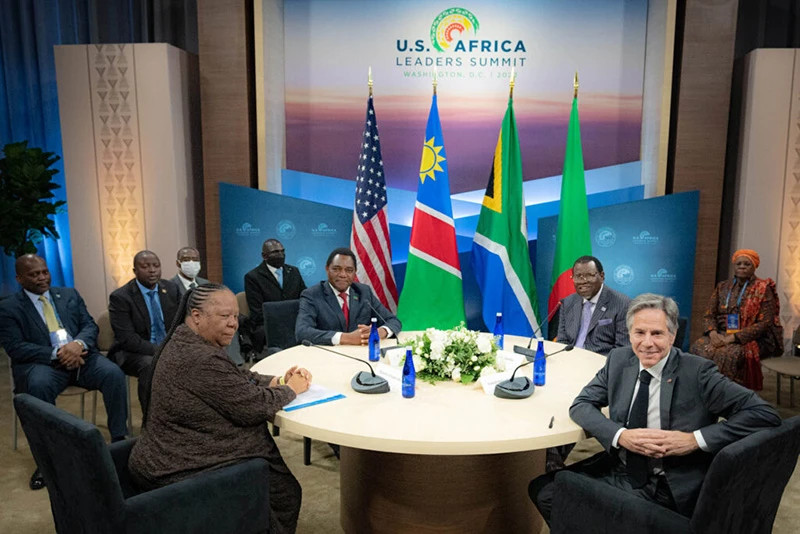The message expressed throughout the nearly week-long trip of the US Secretary of Defense was that Washington is ready to strengthen cooperation with African countries.
Consecutive visits by US officials are considered the next step to realise the strategy of strengthening relations with Africa, which was issued by President Joe Biden's administration. The strategy has been accelerated since December 2022, with the Conference US-Africa Summit.
In Djibouti, the first stop during his business trip, US Defense Secretary Lloyd Austin stressed the importance of coordination between the two countries to address security challenges.
Meanwhile, visiting Kenya and Angola, he once again affirmed the US’s commitment to building and strengthening security partnerships with other countries, while also discussing African initiatives and solutions to enhance stability throughout the region.
The US Secretary of Defense is the latest senior figure in President Joe Biden's administration, to travel to Africa this year. Previously, Africa welcomed Vice President Kamala Harris, Secretary of State Antony Blinken, Treasury Secretary Janet Yellen and US Ambassador to the United Nations Linda Thomas-Greenfield.
Consecutive visits by US officials are considered the next step to realise the strategy of strengthening relations with Africa, which was issued by President Joe Biden's administration. The strategy has been accelerated since December 2022, with the Conference US-Africa Summit.
Analysts said steps to get closer together will benefit both the US and Africa. The visit of Defense Secretary Austin and senior US officials took place when Africa faced a series of challenges, such as food insecurity, climate change, and military conflicts. In addition, recent consecutive coups have also threatened to reverse the democratisation process on this continent.
Analysts said steps to get closer together will benefit both the US and Africa. The visit of Defense Secretary Austin and senior US officials took place when Africa faced a series of challenges, such as food insecurity, climate change, and military conflicts. In addition, recent consecutive coups have also threatened to reverse the democratisation process on this continent.
Many experts fear that conflicts and coups could destabilise Africa, negatively impacting the region's weak economy and exacerbating the challenges of poverty and inequality. As a result, African countries have been pushed into a vicious cycle of violence and poverty with no way out. In that context, Washington's commitments to ensuring security, promoting economic recovery, enhancing food security and increasing investment in infrastructure, healthcare and renewable energy projects, have great significance for this continent.
Meanwhile, the US cannot ignore the attraction of the African region. In the context that many countries around the world are facing rapid population ageing, with many consequences, Africa has the advantage of a young population and rapid population growth, creating great potential in terms of human resources. Along with rich natural resources, Africa is also a destination that attracts international investors and leading powers around the world, such as Russia and China.
In addition, the region's role in the international arena was increasingly affirmed when the African Union (AU) joined the Group of leading developed and emerging economies in the world (G20), as an official member. President Joe Biden repeatedly affirmed his desire to strengthen US relations with Africa. During his recent trip to Africa, Secretary of Defense Austin once again affirmed Africa's important position in the US’s foreign policy.
To strengthen its position in Africa, since taking power, President Joe Biden's administration has made efforts to warm up relations with this continent. In December 2022, before the US-Africa Summit, Washington pledged funding of 55 billion USD, to support Africa in promoting its economy, health and security over three years. During his visit to the Republic of Niger in March, US Secretary of State Antony Blinken also announced humanitarian aid worth 150 million USD for the Sahel region.
In addition, US officials have just announced that in early November, the US-Sub-Saharan Africa Trade and Economic Cooperation Forum is expected to take place in Johannesburg, the economic centre of South Africa. One of the main topics of discussion at the forum will be the future of the African Growth and Opportunity Act (AGOA). This is a trade incentive programme, that the US offers to the region, which provides duty-free treatment to goods of designated sub-Saharan African countries (SSAs). It is expected to expire in 2025. Calling for the extension of AGOA, Minister of Trade South African Trade and Industry Ebrahim Patel said, that the extension of the law will benefit both Africa and the US.
During her recent visit to Africa, US Vice President Kamala Harris affirmed that the relationship between the US and Africa is very important, but its development is not commensurate with its potential. Analysts expect that with strong progress in recent times, Washington will speed up its journey of engaging with the potential African region.
















